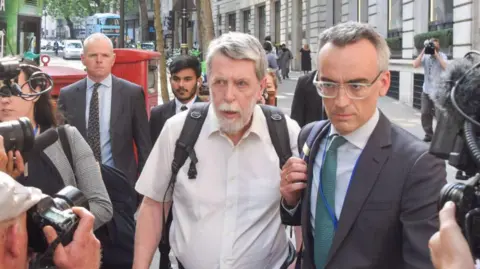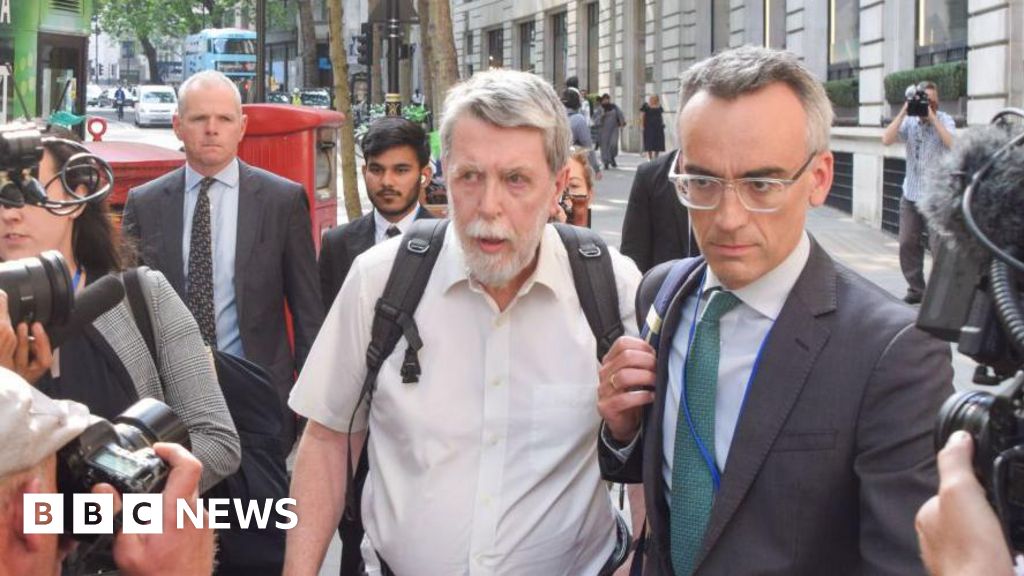By Tom Espiner, BBC business reporter • Emma Simpson, BBC business correspondent
 Getty Images
Getty ImagesA former Fujitsu software engineer who appeared as an expert witness in court has admitted the Post Office asked him to alter his draft witness statement to make it less emotive.
The public inquiry into the Horizon scandal heard that evidence that Gareth Jenkins was preparing for the case against sub-postmaster, Noel Thomas, was changed to save the Post Office embarrassment.
Mr Thomas was sentenced to nine months for false accounting in 2006 and spent his 60th birthday in prison.
He was one of more than 700 sub-postmasters who were prosecuted for fraud and theft by the Post Office, based on faulty data from Fujitsu’s Horizon accounting system.
Mr Jenkins, who helped to develop the system, was being questioned for a second day at the public inquiry into the scandal.
On Tuesday he apologised for his role in the wrongful conviction of sub-postmistress, Seema Misra, who was jailed for theft when she was eight weeks pregnant.
However, Ms Misra told the BBC that the statement from Mr Jenkins was “too little, too late”.
‘System failure’
On Wednesday the inquiry was shown drafts of witness statements by Mr Jenkins, drawn up as Post Office prosecutors prepared their case against Mr Thomas.
In his first draft, Mr Jenkins said “system failure” could be one of the reasons behind the problems at Mr Thomas’ branch, adding that “such failures are normal occurrences”.
The inquiry was shown how this line had been deleted, in edits to the document made by Post Office investigator, Graham Ward.
Mr Ward added in tracked changes to the document: “This is a really poor choice of words which seems to accept that failures in the system are normal and therefore may well support the postmasters’ claim that the system is to blame for losses !!!!”
In a separate email to Mr Jenkins, Mr Ward told him his statement needed work, saying it was “potentially very damaging” and that the Post Office needed to ensure it was not “embarrassed” in court.
At the inquiry Mr Jenkins was asked if he agreed that Mr Ward was trying to influence a witness statement to be used in criminal proceedings before the Crown Court. “I think it could be interpreted in that way,” he replied.
Mr Jenkins said it was clear Mr Ward wanted to use less emotive language, but that he was happy with the wording he had ended up with.
Mr Jenkins’ statement was not ultimately heard in court, as Mr Thomas pleaded guilty.
Remote access
Lead counsel Jason Beer also asked Mr Jenkins a series of questions about how much he knew about Fujitsu’s ability to remotely access sub-postmasters’ computers.
In its prosecutions, the Post Office had argued that Horizon could not be accessed remotely by any other party.
The Post Office said that therefore the accused sub-postmasters must have been responsible for the shortfalls in their accounts.
But this turned out to be untrue, depriving those accused of an important line of defence.
Remote access was not only possible by Fujitsu’s engineers, it could be done without leaving any trace, in a way that was indistinguishable from changes made by sub-postmasters.
Mr Jenkins told Mr Beer he had only found this out in 2018.
However, an earlier key witness at the inquiry, Second Sight forensic investigator Ian Henderson, suggested that Mr Jenkins was aware that remote access was possible much earlier.
Mr Henderson alleged that Mr Jenkins had told him in 2012 that Fujitsu “routinely used remote access to branch terminals” without sub-postmasters’ knowledge or consent.
This included making “keystrokes that were indistinguishable from a sub-postmaster accessing the terminal directly”.
When challenged over Mr Henderson’s testimony, Mr Jenkins said he did not think he would have said that, but added that the general details of remote access were accurate.
He said it was correct “that there was remote access, yes, but not in terms of the gory details” given by Mr Henderson.
Mr Jenkins is being investigated by the Metropolitan Police on suspicion of perjury.

